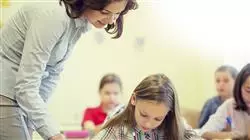University certificate
The world's largest faculty of education”
Why study at TECH?
With this Postgraduate diploma you will know how to distinguish the Multiple Intelligences in your students and orient the teaching to them”

When addressing a person, an audience and in general any environment, we adapt the message so that it is the most appropriate to the context itself. With this in mind, why not also adapt, on an individual basis, the way of explaining the subjects to be taught in a class? Starting from this question, education professionals must know the methods and tools to use in order to be able to perform a detailed and adapted praxis for each of their students.
This is where, according to the teacher's aptitudes, to be able to discern between some types of profiles and others and to be able to adapt the way in which he addresses them, teaches them and generally behaves in the educational environment. Achieving this, the reception of the contents by these students will be much more effective, given the adaptability of the information according to their psychological and intelligence models. For this reason, TECH has created this Postgraduate diploma in Personalized Teaching and Multiple Intelligences for teaching professionals.
In this way, graduates will make a theoretical and practical journey through various of the most important concepts of this branch of specialization, starting from the fundamentals of personalized education, through personalized learning and finally reaching the concepts encompassed in the section on Multiple Intelligences.
Thus, all these contents, together with the structural and methodological nature of the program, manage to create a very complete specialization for those professionals in education who want to go further. Likewise, this Postgraduate diploma in Personalized Teaching and Multiple Intelligences has a 100% online profile, which can be accessed from anywhere in the world through an electronic device with internet access. Likewise, the way in which the contents are taught is such that graduates will be able to continue with their professional obligations while they complete the course load, without having to sacrifice more time than necessary in the assimilation of concepts.
Understand the keys to planning and developing a reverse learning model and how you can apply those concepts in the classroom”
This Postgraduate diploma in Personalized Teaching and Multiple Intelligences contains the most complete and up-to-date educational program on the market. The most important features include:
- The development of case studies presented by experts in Teaching and Education
- The graphic, schematic and practical contents of the book provide theoretical and practical information on those disciplines that are essential for professional practice
- Practical exercises where the self-assessment process can be carried out to improve learning
- Its special emphasis on innovative methodologies
- Theoretical lessons, questions to the expert, debate forums on controversial topics, and individual reflection assignments
- Content that is accessible from any fixed or portable device with an Internet connection
To know how to address someone you often have to understand where they are coming from. Delve into the concepts of human nature and the identity of the educational setting in this specialization program”
The program’s teaching staff includes professionals from the sector who contribute their work experience to this educational program, as well as renowned specialists from leading societies and prestigious universities.
Its multimedia content, developed with the latest educational technology, will provide the professional with situated and contextual learning, i.e., a simulated environment that will provide an immersive education programmed to learn in real situations.
The design of this program focuses on Problem-Based Learning, by means of which the professionals must try to solve the different professional practice situations that are presented throughout the program. For this purpose, the student will be assisted by an innovative interactive video system created by renowned experts.
Expand your knowledge in neuroscience and education with a complete specialization program"

Become a benchmark in the recognition of single and multiple types of intelligence"
Syllabus
This Postgraduate diploma is elaborated on the basis of a technique specific to TECH, in which graduates will not have to sacrifice neither time nor effort in spending long hours in front of a screen trying to assimilate content in a tedious way. With Relearning, a study methodology in which learning is done gradually and repeatedly, added to a study style without ties, in which the student can decide how and when to complete the contents, given the online nature of the programs and the possibility of remote access to the syllabus.

Thanks to TECH Global University study program and methodologies, you will be able to decide when and where to specialize as an expert in Personalized Teaching and Multiple Intelligences”
Module 1. Foundations of Personalized Education
1.1. Human Nature and Person
1.1.1. Human Nature, Person and Personality
1.1.2. Personal Identity
1.1.3. Dimensions of the Human Being
1.1.4. The Person in Educational Scenarios
1.2. The Person and the Personalized Education
1.2.1. Principles of Personalized Education
1.2.2. Technical Factors that Enable the Practice of Personalized Education
1.2.3. The Model of the Personalized Learning
1.2.4. Personalized Education and Neuropsychology
1.3. Educational Design and Teaching Personalization
1.3.1. Teaching to Learn: Metacognition
1.3.2. Personalized Education Design
1.3.3. Personalized Education Style
1.3.4. Personalized School Environment
1.4. Personalize Education
1.4.1. Operation and Participative Methodology
1.4.2. Situations and Techniques of Personalized Education
1.4.3. Personalized Schedule
1.4.4. Activities in Personalized Education
1.5. Motivation and Personalized Education
1.5.1. Concept of Motivation
1.5.2. Motivation and Society
1.5.3. Means and Resources for Teaching Motivation
1.5.4. Motivation Strategies
1.6. Personalized Learning: The Active Role of the Learner
1.6.1. Learning Styles
1.6.2. Thinking Styles
1.6.3. Learning Strategies
1.6.4. Metacognition and Learning
1.7. Learning Personalization in a School
1.7.1. School Organization
1.7.2. Educational Agents in a School: the Educational Community
1.7.3. School Coexistence
1.7.4. Spaces and Material Factors in Personalized Education
1.8. The Role of the School Counselor in Teaching Personalization
1.8.1. School Counselor Who is He/She and What are His/Her Duties?
1.8.2. The Counselor Work: Types of Guidance
1.8.3. Orientation and Family
1.8.4. The Orientation and the Personalized Education
1.9. Teaching Efficiency and Personalization
1.9.1. Traditional Psychoeducational Paradigms and Methods: Behaviorism and Cognitivism
1.9.2. Constructivism in Education
1.9.3. The Emotional-Personalizing Model
1.9.4. Efficient Teaching
1.10. Personalized Education and Agenda 2030
1.10.1. Agenda 2030: A Common Agreement
1.10.2. Sustainable Development Goals
1.10.3. Quality Education
1.10.4. Professional Skills and Educational Skills for Quality Education
Module 2. Personalized Learning
2.1. Reverse Learning: Flipped Classroom and Flipped Learning
2.1.1. Reverse Learning: Flipped Classroom and Flipped Learning
2.1.2. History of the Development of Reverse Learning Methodologies
2.1.3. Innovation and Flipped Classroom
2.1.4. The Teaching Role and the Students in Reverse Learning:
2.2. Planning and Development from the Reverse Learning Model
2.2.1. Benefits and Challenges of Reverse Learning:
2.2.2. Resources and Contents for Reverse Learning
2.2.3. Educational Program of the Reverse Classroom
2.2.4. Evaluation and Reverse Learning
2.3. Personalized Learning and the Digital World
2.3.1. Digitization and the Information Society
2.3.2. Learning and Social Networks
2.3.3. Educational Networks
2.3.4. Teaching Networks
2.4. Learning Environments and Virtual Learning Environment
2.4.1. Technology in the Educational World
2.4.2. Digital Educational Tools
2.4.3. Virtual Teaching Environments
2.4.4. Personal Learning Environments (PLE)
2.5. Social Learning and Personalized Learning
2.5.1. Social Learning Theories
2.5.2. Collaboration and Cooperation in Learning
2.5.3. Cooperation Structure and Strategies
2.5.4. From Constructivism to Connectivism
2.6. Productive Learning
2.6.1. Productive Learning: Conceptualization
2.6.2. The Rural Education System and Productive Learning
2.6.3. Educational Quality and Productive Learning
2.6.4. Educational Model of Productive Learning
2.7. Cooperative Learning I
2.7.1. Conceptualization: Cooperative Learning
2.7.2. Justification of Cooperative Learning
2.7.3. Theoretical Framework of Cooperative Learning
2.7.4. Guide of Cooperative Learning: The Teacher
2.8. Cooperative Learning II
2.8.1. Inclusion and Cooperative Learning
2.8.2. Cooperate to Learn, Learn to Cooperate
2.8.3. Cooperative Learning Oriented to Equity
2.8.4. Cohesion, Inclusion, Equity and Other Keys of Cooperative Learning and Inclusion
2.9. Learning Communities
2.9.1. The Dialog and its Learning Effects
2.9.2. Dialogic Theories
2.9.3. Concept and Basic Elements of CA
2.9.4. Commissioning of a Learning Community
2.10. Personalized Learning and Emotion
2.10.1. Emotional Education
2.10.2. Positive Psychology
2.10.3. Emotional Competencies of the Teacher
2.10.4. Didactics of Emotional Education
Module 3. Multiple intelligences
3.1. Intelligence Single or Multiple?
3.1.1. First Approaches to the Study of Intelligence
3.1.2. Explanatory Models: Hierarchical and Multifactorial
3.1.3. Recent Theories of Intelligence
3.1.4. Theory of Multiple Intelligences
3.2. Multiple Intelligences
3.2.1. Linguistics and Logical-Mathematical Intelligence
3.2.2. Bodily and Naturalistic Kinesthetic Intelligence
3.2.3. Musical and Spatial Intelligence
3.2.4. Personal Intelligences: Interpersonal and Intrapersonal
3.3. Multiple Intelligences and Learning Styles
3.3.1. Learning Styles of Students with a High-Linguistic Tendency
3.3.2. Learning Styles with High-Kinesthetic-Corporal Tendency
3.3.3. Learning Styles with a Logical-Mathematical Tendency
3.3.4. Learning Styles and other Tendencies
3.4. Assessment of Multiple Intelligences
3.4.1. Characteristic features of MI Assessment
3.4.2. The Observation Method and Observation Inventories
3.4.3. Portfolio
3.4.4. Multiple Intelligences and Performance Assessment
3.5. Basic Competencies and Multiple Intelligences
3.5.1. What are Basic Competencies??
3.5.2. Competency-Based Education
3.5.3. Competencies and Intelligences
3.5.4. Performance Indicators
3.6. Neurosciences and Multiple intelligences
3.6.1. The Brain and Learning
3.6.2. Neurosciences and Education
3.6.3. The Creative Brain
3.6.4. The Excited Brain and Exciting Education
3.7. Cooperative Learning
3.7.1. What is Cooperative Learning?
3.7.2. The Fundamentals of Cooperative Learning
3.7.3. Methodology of Cooperative Learning
3.7.4. Strategies and Techniques for Cooperative Learning
3.8. Creativity and Intelligence
3.8.1. What is Creativity?
3.8.2. Multiple Intelligences and Creativity
3.8.3. Creativity and Education
3.8.4. Creativity Evaluation
3.9. Multiple Intelligences in the Classroom
3.9.1. Multiple Intelligences and Educational Syllabus
3.9.2. Multiple Intelligences and Teaching Strategies
3.9.3. Multiple Intelligences and Special Education
3.9.4. Multiple Intelligences and the Classroom
3.10. Tools for Programming and Intervention in Multiple Intelligences
3.10.1. Spectrum Project
3.10.2. Programming in Multiple Intelligences
3.10.3. Games for Multiple Intelligences
3.10.4. ICT Applications to Work on the IM in the Classroom

A program aimed at specializing teaching professionals who want to become a reference in terms of detailed, targeted and effective education"
Postgraduate Diploma in Personalized Teaching and Multiple Intelligences
In the classroom, teachers are obliged to adapt their teaching methods to the needs of each student in order to achieve individualized and fully resolute learning. To achieve this, teachers must have the ability to discern between different types of profiles and adapt their way of communicating, teaching and behaving in the educational environment according to the psychological and intellectual needs and patterns of each student. If this level of adaptability is achieved, the reception of content will be much more effective for students. With this in mind, TECH has developed the Postgraduate Diploma in Personalized Teaching and Multiple Intelligences. This program offers the tools and methodologies necessary for teachers to adapt to the requirements of each student and provide first-rate teaching.
Study a first class academic program
Through the Postgraduate Diploma in Personalized Teaching and Multiple Intelligences, you will have the opportunity to explore the most important concepts of individualized education, assimilating the most effective methodologies to adapt learning to the needs of the student or the techniques to manage the different types of intelligence in the classroom. The structural and methodological nature of the program, together with its comprehensive content, make it an ideal specialization for teachers who wish to delve deeper into this field. In addition, it is taught online, which means you can access it from anywhere in the world with an Internet connection. The way the content is delivered allows you to fulfill your professional obligations while completing the academic load, without having to sacrifice more time than necessary to assimilate key concepts.







